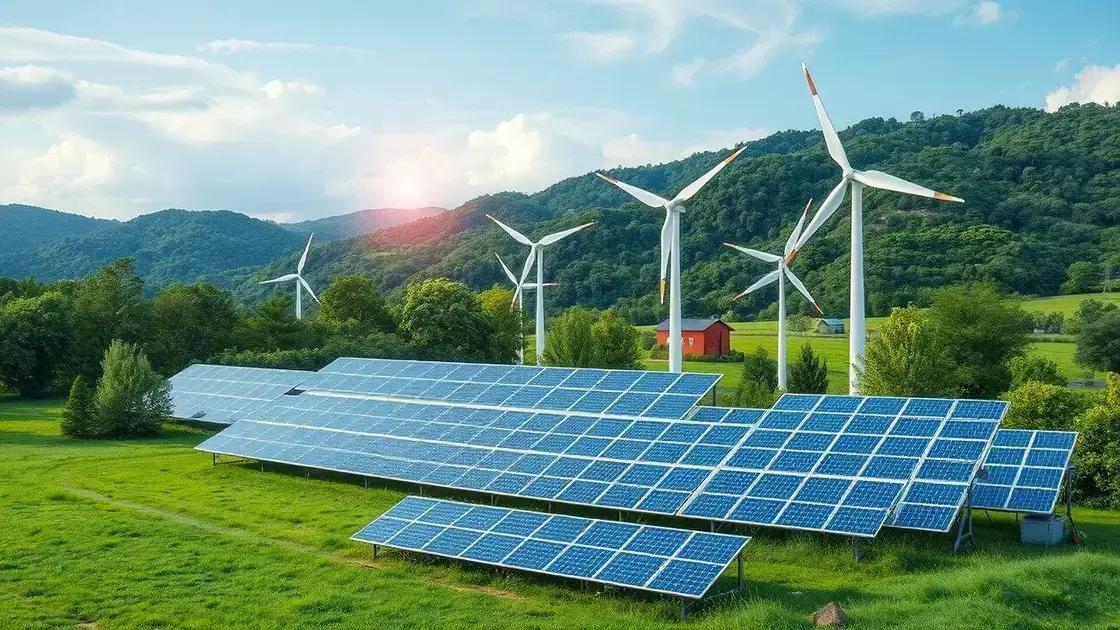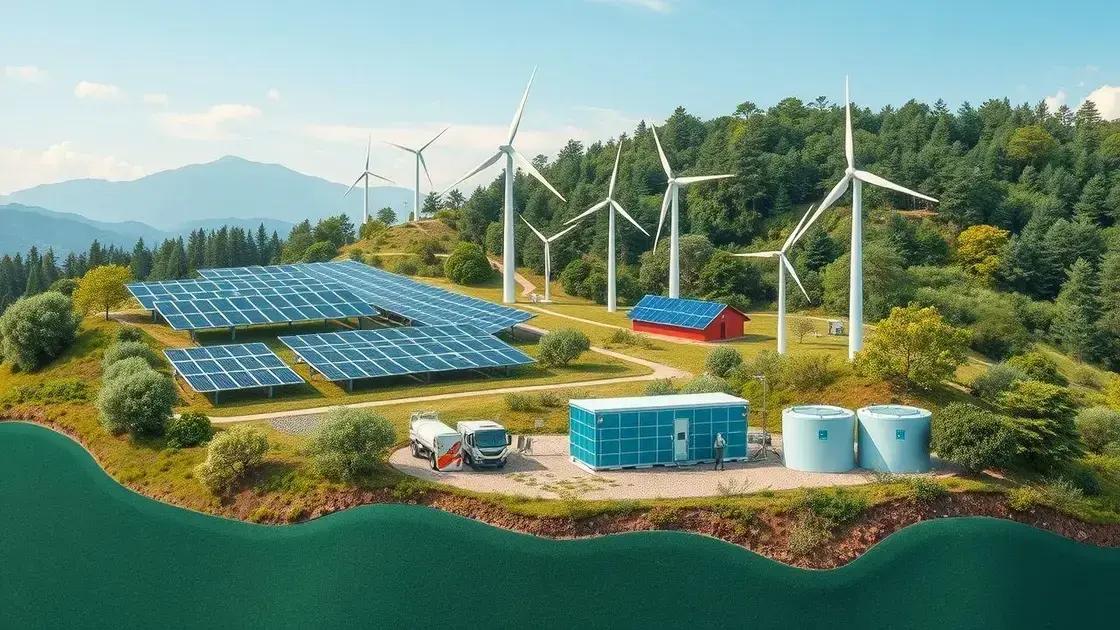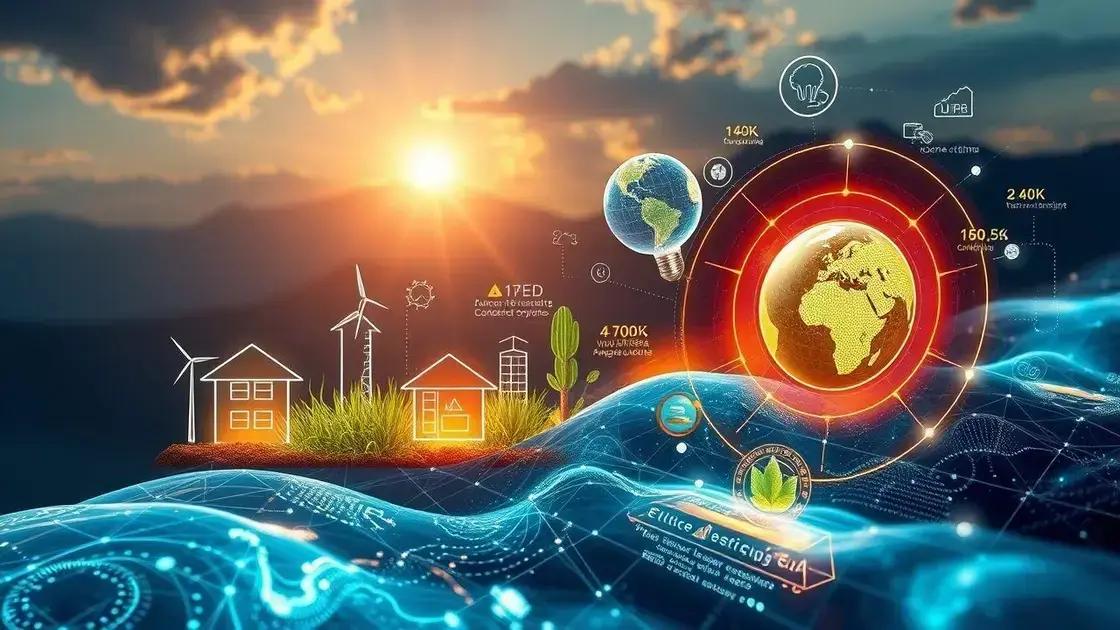Insights on climate tech developments for a sustainable future

Insights on climate tech developments focus on innovative technologies aimed at reducing carbon footprints, promoting renewable energy, and fostering sustainable practices to combat climate change effectively.
Insights on climate tech developments reveal how technology plays a pivotal role in addressing climate challenges. With so many innovations, have you ever wondered how these advancements might reshape our world?
Defining climate technology and its importance
Defining climate technology is essential for understanding our efforts to combat climate change. Climate tech refers to the range of innovative solutions that aim to reduce greenhouse gas emissions and enhance environmental sustainability. It encompasses various fields including renewable energy, energy efficiency, waste management, and sustainable agriculture. By harnessing modern technology, we can create effective tools that support a healthier planet.
Key Types of Climate Technology
There are several main areas where climate technology plays a crucial role:
- Renewable Energy: Technologies such as solar panels and wind turbines convert natural resources into energy.
- Energy Efficiency: These solutions help businesses and homes use less energy, leading to reduced emissions.
- Sustainable Transport: Innovations in electric vehicles and public transportation systems help lower carbon output.
- Carbon Capture: Techniques that capture and store CO2 emissions from various sources.
Each of these technologies contributes to building a sustainable future. For instance, the adoption of renewable energy not only generates power but also decreases dependency on fossil fuels. As governments and companies focus on reducing their carbon footprint, climate tech becomes increasingly significant.
Importance of Climate Technology
The importance of climate technology cannot be overstated. It helps mitigate the effects of climate change by promoting sustainable practices. This technology is vital for meeting global climate goals and reducing harmful emissions. Furthermore, advancements in climate tech can drive economic growth through job creation in clean energy sectors.
Moreover, technology plays a key role in educating individuals and businesses about their environmental impact. With platforms that provide information on carbon footprints, consumers can make more sustainable choices. As awareness grows, so does the demand for innovative solutions that can address climate challenges.
Recent advancements in renewable energy

Recent advancements in renewable energy have transformed the way we generate power. These innovations are crucial in the fight against climate change and reduce our reliance on fossil fuels. By utilizing natural resources, we can create cleaner energy sources that benefit both the environment and society.
Innovative Technologies
Several new technologies are enhancing renewable energy capabilities. Solar panels, for instance, have become more efficient and affordable, making solar energy accessible to more people. Wind turbines are also advancing, with larger designs that capture more wind energy, leading to increased energy production.
- Energy Storage Solutions: New battery technologies allow us to store renewable energy for later use.
- Smart Grids: These systems improve energy distribution and efficiency.
- Offshore Wind Farms: Capturing wind energy over oceans allows for more consistent energy generation.
- Bioenergy Innovations: Using organic materials for energy contributes to a circular economy.
Transitioning to renewable energy is essential for reducing greenhouse gas emissions. The focus is not only on producing energy sustainably but also on ensuring its reliability. For example, the integration of solar farms and wind installations into the power grid has led to significant improvements in energy resilience.
Global Trends
The global energy landscape is shifting towards a more sustainable model. Nations around the world are investing heavily in renewable energy infrastructure. According to recent reports, investments in renewables outpace those in fossil fuels, showcasing a commitment to a greener future. Countries are setting ambitious targets for transitioning to renewable sources.
Not only do these advancements lead to cleaner air, but they also create job opportunities in the clean energy sector. The industry’s growth enhances national security by reducing dependency on imported fuels. As technology continues to evolve, we can expect even more innovative solutions to emerge.
Innovative practices for reducing carbon footprint
Innovative practices for reducing carbon footprint are becoming increasingly essential as we face the challenges of climate change. From individual actions to corporate strategies, everyone plays a role in creating a more sustainable future. By implementing effective practices, we can significantly lower our impact on the environment.
Effective Strategies
There are many strategies that individuals and businesses can adopt to minimize their carbon footprints. These include:
- Energy Efficiency Improvements: Upgrading to energy-efficient appliances and lighting can drastically reduce energy consumption.
- Remote Work Options: Allowing employees to work from home cuts down on commuting emissions.
- Sustainable Transportation: Using public transit, biking, or carpooling can lower gasoline usage.
- Waste Reduction Initiatives: Reducing, reusing, and recycling helps minimize landfill waste and lower greenhouse gas emissions.
Another important practice is adopting a plant-based diet. The animal agriculture industry is a significant contributor to greenhouse gas emissions. By incorporating more plant-based meals into our diets, we can reduce demand for meat and dairy, ultimately lowering our carbon footprint.
Corporate Responsibility
Businesses also have a crucial role to play in reducing emissions. Many organizations are committing to sustainable practices through corporate social responsibility initiatives. For instance, companies are now investing in renewable energy sources and implementing sustainability programs to lower their operational impacts.
Furthermore, leveraging technology like carbon tracking software allows companies to monitor their carbon footprints accurately. This awareness helps businesses set realistic goals for emissions reductions. As firms strive for sustainability, it not only benefits the environment but also enhances their brand image and meets consumer demand for greener products.
Future trends in climate tech and their impact

Future trends in climate tech and their impact will shape the way we combat climate change in the coming years. As technology evolves, we can expect to see innovative solutions that not only reduce emissions but also promote sustainable development. Many experts believe that advancements in this field will lead to significant changes in how we generate energy, manage resources, and protect the environment.
Emerging Technologies
New technologies are expected to emerge as key players in the quest for sustainability. For example, artificial intelligence (AI) will be used to optimize energy use in buildings and industries, making them more efficient. Additionally, advancements in battery technology will allow for better energy storage from renewable sources, making clean energy more reliable and accessible.
- Carbon Management Solutions: Technologies focused on capturing and storing carbon emissions will gain traction.
- Sustainable Agriculture Practices: Innovations in farming, such as precision agriculture, will enhance food production while minimizing environmental harm.
- Decentralized Energy Systems: Microgrids and community solar projects will empower local energy generation.
- Circular Economy Approaches: Businesses will increasingly adopt practices that reuse materials and minimize waste.
As these trends develop, we will see a broader shift towards a circular economy. This approach reduces resource consumption and promotes recycling and reuse of materials, significantly lowering the overall carbon footprint. The integration of sustainable practices across various sectors will contribute to a more resilient and eco-friendly economy.
Impact on Society and the Environment
The impact of these technology trends will be profound. As society embraces cleaner energy solutions, the reliance on fossil fuels will decrease, leading to improved air quality and a reduction in greenhouse gas emissions. This will also create new jobs in emerging industries, driving economic growth and promoting social equity.
Moreover, innovations in climate tech will empower individuals and communities to take action. With tools that provide greater transparency about energy consumption and carbon emissions, people can make informed choices that contribute to a sustainable future. Education and awareness will play crucial roles in promoting widespread adoption of these practices.
FAQ – Frequently Asked Questions about Climate Technology
What is climate technology?
Climate technology refers to the innovative solutions and practices aimed at reducing greenhouse gas emissions and promoting sustainability.
How can individuals contribute to reducing their carbon footprint?
Individuals can contribute by adopting energy-efficient appliances, using public transportation, and incorporating more plant-based meals into their diets.
What role do businesses play in climate technology?
Businesses can adopt sustainable practices, invest in renewable energy, and implement corporate social responsibility initiatives to lower their carbon emissions.
What are the future trends in climate technology?
Future trends include advancements in renewable energy, AI for optimizing energy use, and circular economy approaches that focus on recycling and waste reduction.





